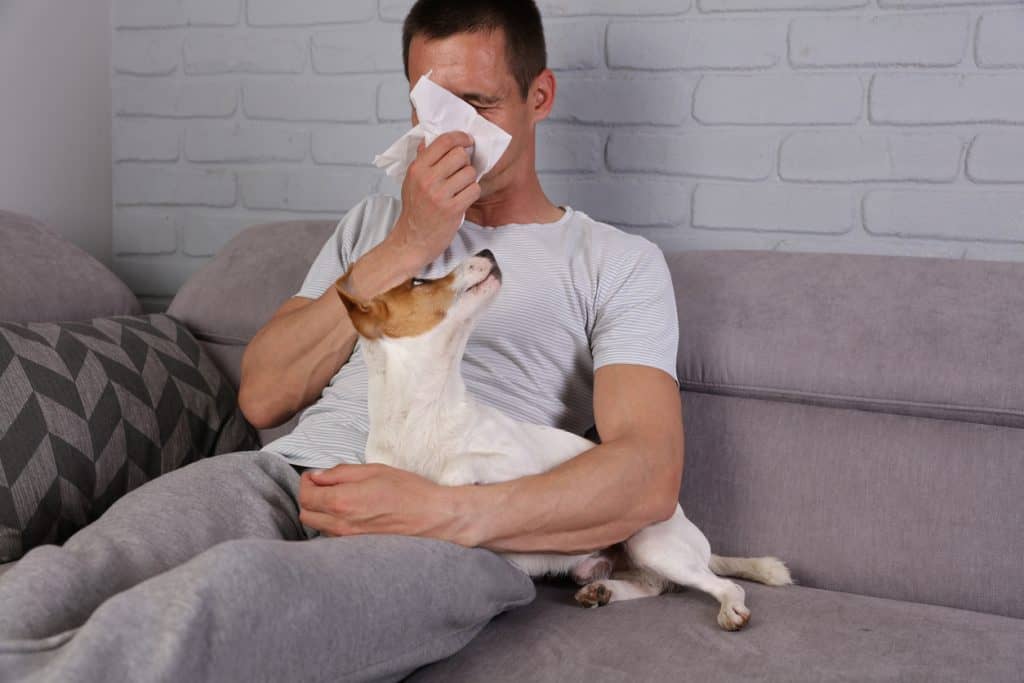What is a hypoallergenic dog? When most people see the phrase “hypoallergenic dogs” they think of a dog that will not cause any allergic reaction. Period. And, unfortunately, some breeders embed this notion by using the word hypoallergenic as a sales pitch. Contrary to popular belief, there is no such thing as an allergen free dog. So, what should those of us with dog allergies do?
A friend of my mother’s bought a yorkiepoo a few years ago. She was told that this dog would not shed and was hypoallergenic. But the breeder exaggerated the meaning of hypoallergenic to mean allergy free. While poodles are known as hypoallergenic dogs they are in no way allergy free, and a yorkie doesn’t even come close to hitting that mark. Well, her dog definitely took after the yorkie side and sheds constantly. Needless to say, she was not happy, she thought she was getting a “hypoallergenic dog” that wouldn’t shed, what she ended up with was the exact opposite!
Table of Contents
What Causes People to be Allergic to Dogs

The root of the problem lies in the persons immune system. Dogs secrete proteins through their skin, saliva, urine. These proteins can be carried in the air on dander, or aerosolized vapors from barking and even urinating. When inhaled or get on our skin from say a kiss from a pooch, the allergic person’s immune system goes into overdrive to fight these nasty invaders. They can experience sneezing, coughing, itchy red eyes, itchy throat, hives, and so much more depending on the severity of their allergy.
What Is a Hypoallergenic Dog?
First you have to look at the definition of hypoallergenic. Hypoallergenic only means relatively unlikely to cause an allergic reaction, not 100% allergen free. So, by that definition, yes there is such a thing as a hypoallergenic dog. Breeds believed to be hypoallergenic, like the Poodle (both standard and toy), are classified as hypoallergenic because of minimum shedding. Less shedding means less dander, equals less of a risk of causing an allergic reaction. But (you knew a but was coming) that only pertains to those allergic to dander. Those who are allergic to proteins in dog urine and saliva are at just as much of a risk from a hypoallergenic dog than and non-hypoallergenic dog.
Hope for Allergy Sufferers

For those suffering from dog allergies, the struggle is real! The dream of a dog that won’t throw them into a full blow allergic reaction can feel miles away to some. But there is hope! First, a visit to an allergist would be highly recommended. Being able to identify the allergen causing your reactions is paramount. Blood tests have become much more specific in terms of determining the exact protein causing your symptoms, such as those found in dog dander, urine, or saliva. The FDA recently approved a blood test for the protein Can f 5 which was isolated and linked to causing allergic reactions in humans. The protein is only produced in the prostate gland of male dogs meaning that those found to be sensitive to this protein would be fine living with female dogs. Neutered dogs do not produce as much of this protein, but it is still present.
AKC List of Breeds That Come Close to Being Hypoallergenic Dog Breeds

Again, no dog is 100% allergy free, but these breeds may have a lower chance of triggering allergic reactions.
- Afghan Hound
- American Hairless Terrier
- Bedlington Terrier
- Bichon Frise
- Chinese Crested
- Conton de Tulear
- Giant Schnauzer
- Irish Water Spaniel
- Kerry Blue Terrier
- Lagotto Romagnolo
- Maltese
- Miniature Schnauzer
- Peruvian Inca Orchid (Hairless)
- Poodle (standard, miniature, and toy)
- Portuguese Water Dog
- Soft Coated Wheaten Terrier
- Spanish Water Dog
- Standard Schnauzer
- Xoloitzcuintli
Doodles are a Gamble
I know I’m probably going to be unpopular for saying this, but all those doodles everyone raves about being hypoallergenic…might not be. I’m not going to get into all the complicated genetics, it’s boring and hard to type, but there are so many combinations of genes you never know what traits any one puppy is going to inherit. While there is a strong movement to label some of these mixes as breeds, like the labradoodle and the goldendoodle, it is much to early to get a clear breed standard. Because of that you can’t know without a shadow of a doubt it will be a hypoallergenic dog. A good breeder (and there are some very good dedicated doodle breeders) will not sell you a doodle just because it is hypoallergenic, nor will that be their own selling point if even one at all.
Should Allergy Sufferers Own a Dog?

Everyone is different and so are their allergies. Some have mild reactions while others have severe, but through careful research, planning, and preparation dog ownership is possible for many allergy sufferers. It is all dependent on the severity of your allergic reaction. Mild to moderate allergy suffers can mitigate the risk of reaction by cleaning, grooming, and laundering often. But there does unfortunately comes a point where you don’t want to risk your health or the quality of life for your potential furbaby.
In conclusion, yes, hypoallergenic dogs do exist, allergy free dogs do not, no matter how insistent the breeder or your cousin insists that they are. That’s the most important piece of information if you are considering getting a dog and have allergies. No dog will ever be 100% allergy free, but with proper testing, treatment, preparation, and commitment you, too, can enjoy a dog at your side.



